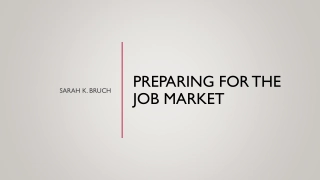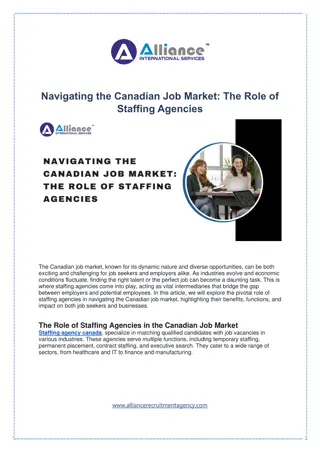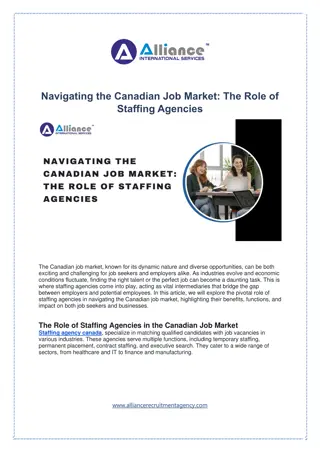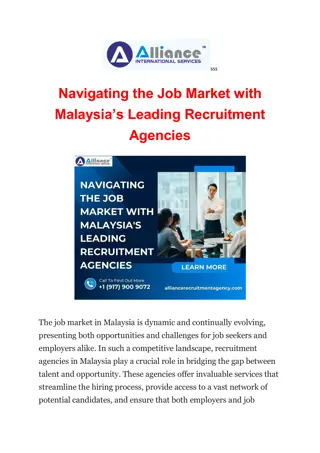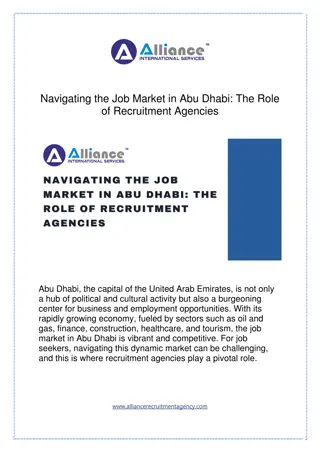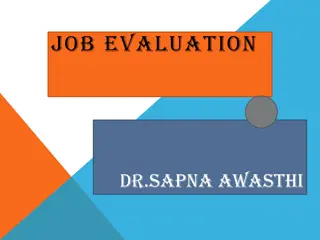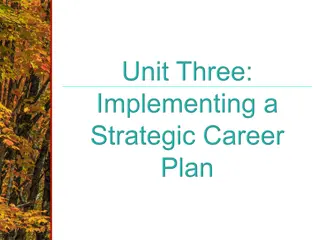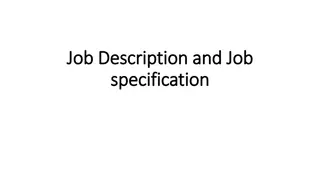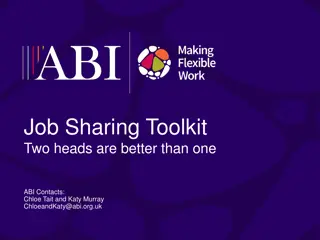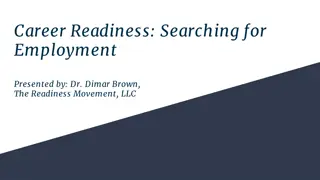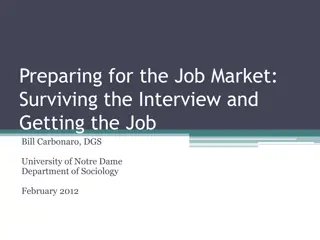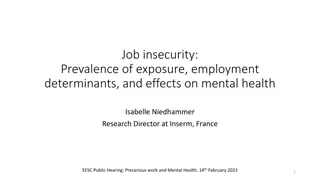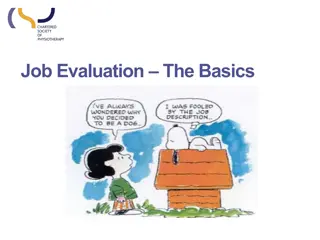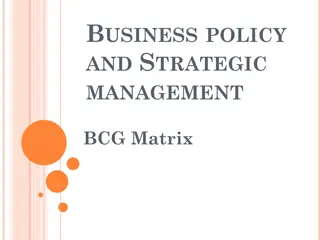
Unveiling the Hidden Job Market: Strategies to Find Unadvertised Opportunities
Discover effective tactics to tap into the hidden job market where opportunities are not publicly advertised. Learn how to leverage networking, informational interviews, and direct outreach to uncover potential job openings and advance your career. Enhance your job search strategy today!
Download Presentation

Please find below an Image/Link to download the presentation.
The content on the website is provided AS IS for your information and personal use only. It may not be sold, licensed, or shared on other websites without obtaining consent from the author. If you encounter any issues during the download, it is possible that the publisher has removed the file from their server.
You are allowed to download the files provided on this website for personal or commercial use, subject to the condition that they are used lawfully. All files are the property of their respective owners.
The content on the website is provided AS IS for your information and personal use only. It may not be sold, licensed, or shared on other websites without obtaining consent from the author.
E N D
Presentation Transcript
The Hidden Job Market is exactly as it sounds... It is the job market that is not obviously advertised, therefore, it is hidden.
Most job openings are not advertised, creating what seems like a hidden job market . Information about available work is circulated through managers networks of co-workers, business associates, friends and acquaintances.
How can you find out about these jobs? Research potential employers and sectors Contact potential employers Use your network Do a letter writing campaign Join a job-finding club Visit job and career fairs http://www.jobsetc.gc.ca/pieces.jsp?category_id=298
The Informational Interview can be a useful way to find out more about the kind of industry or company you would like to work for. While this technique is not designed for finding a job, the contacts you make may lead you to job openings.
Visit potential employers' home pages to see if they have a job-posting section. If not, phone the Personnel or hiring manager. Prepare by reviewing your resume and practising what you're going to say.
Write down your opening words in case you get flustered. Here is a sample "script." "Hello, my name is ____________. I understand that your company does _____ and that's my area of career interest. I was wondering if you had any current job openings. If the contact says no, ask if they anticipate any openings in the future or if he/she knows of anyone in the same line of business who does.
Make sure that you get the full name and title of the person you're speaking to. Keep your resume in front of you in case the manager asks you questions. If the manager seems interested, ask if you could meet with him/her to discuss possibilities in more detail.
If the manager can't meet with you, ask if you can send in your resume. Whatever happens, thank your contact. Send a thank-you note and re-state your interest in working for his/her organization. Keep the information on your contact and his/her organization. You never know when you might need it again.
Networking can be your best strategy for finding work Call everyone you know and tell them you're looking for work Ask each person if he/she can recommend someone else you could talk to Contact associations related to your occupation/industry
What is a network? A network is a group of people connected to you through family, friendship, work, education and community.
Have you ever heard the expression: "It's not what you know, but who you know?" Your skills, abilities and knowledge are keys to landing a job, but they may not help get your foot in the door. Most jobs are in the hidden job market, positions that employers hope to fill through personal contacts.
Employers do not often advertise jobs, because they would have to look through resumes, interview people and then hire strangers. They would much rather hire someone who has come to them through a contact. Each person in your network has unique knowledge, experience and contacts that might help you. Not only that, the people in your network have networks of their own. By tapping into one person's know-how, you may also be tapping into the know-how of many other people.
Chances are, you already have a network! At its centre are the people closest to you, your family and friends. Your network can also include your acquaintances, everyone you know socially. The minute you ask an acquaintance if he/she has heard about a job opening, you are making that person part of your network. Here are some people to consider: neighbours and family friends employers and co-workers club members teammates and classmates teachers and coaches community leaders librarians doctors/dentists
Good networkers are people who share in the lives of others by giving and receiving information, advice, support and commitment. Talk to people regularly to see how they're doing. Assist people if they have problems. Phone people on special occasions such as birthdays.
Learn how to ask, listen and respond well during conversation. Contact people in your network if you hear or see something that would interest them. Put yourself in situations where you can meet new people. Help people celebrate their accomplishments and successes.
At these public events, organizations send representatives to talk to job searchers Job/career fairs provide you with a great opportunity to network with several employers at once Check professional associations in your areas of career interest Call the Career Centre at your local university regional or community college Check with your Board of Trade or Chamber of Commerce Search the Internet
Job and career fairs provide great opportunities while you're looking for work. Recruiters set up information booths, hoping to meet and attract many qualified work searchers all at once. These one-stop booths allow you to: Gather information about organizations and job openings. Meet with potential employers. Make personal contacts that could lead to a job. Talking to a recruiter at a fair is less formal than having a job interview. You can relax and put your best foot forward.
Job Fairs Usually arranged by companies, often in one industry, to recruit new employees for actual openings. Generally advertised in newspapers, trade magazines and, possibly, the Internet. Career Fairs Usually held at educational institutions to introduce students to a variety of organizations and career opportunities. Generally only advertised in campus newsletters and newspapers. Find out about job fairs in your area. Check the local newspaper and community websites youth career fairs list or Canada Career Week
Prepare updated resumes in case a recruiter requests one. Have business cards made up--they're not expensive and are a good investment. Find out which organizations will be attending. Research the organizations that interest you--this will help you decide who to talk to and your knowledge will impress recruiters. Be prepared to answer basic interview-style questions about yourself and your career aspirations. Have a list of questions to ask such as: What type of job openings are there in your company? What kind of skills are you looking for in a prospective employee? What kind of education and experience do your employees have? What type of training does your company offer? What is a typical career path in your company?
Hand out your business cards. Take time with each representative--remember, recruiters want to chat and give you information. Be warm, confidentand friendly. Let the informal environment work for you. Don't overstay your welcome--15 or 20 minutes for each employer. Ask recruiters for their business cards. Don't be afraid to visit a recruiter twice if you have some more questions.
Make notes on each employer. Start a file on those companies that interest you. If there is a specific job you're interested in, write a follow-up letter or email. If you hadn't given the recruiter a resume at the event, now's the time to send one. Information for this article was adapted from Don't Wait 'TilYou Graduate by Stephen J. Kaplan and published by Canadian Association of Career Educators and Employers http://www.jobsetc.gc.ca/pieces.jsp?category_id=369&lang=e
The Hidden Job Market is your most valuable job search resource. Build your network and do some career research and you will be well on your way to being meaningfully employed!

